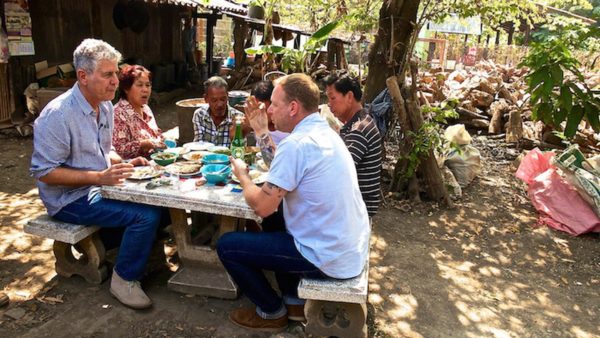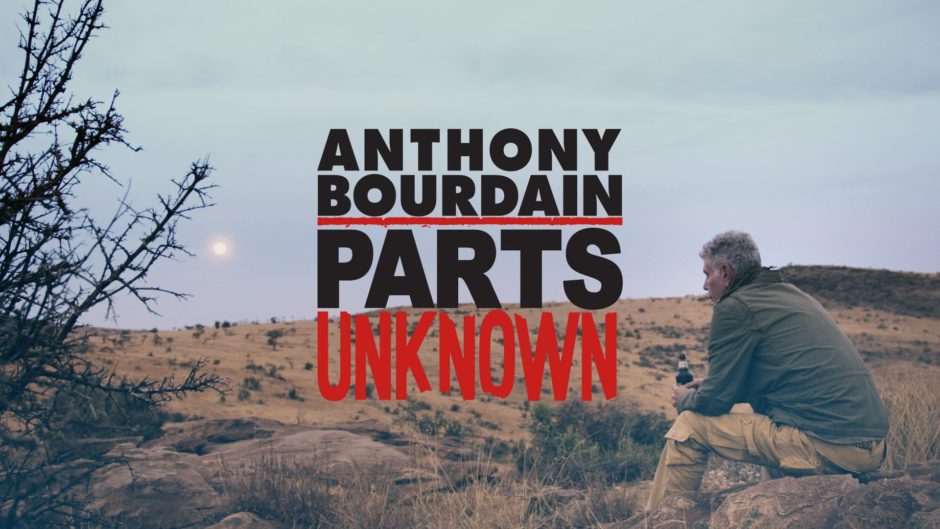Like everyone else who watched his popular CNN television program, Parts Unknown, I was shocked by Anthony Bourdain’s suicide last June. Sadly, he was only 61.
A celebrity chef of partial Jewish ancestry, he brought a palpable sense of joie de vivre to his vivid presentations. Whether in Burma, Canada, Israel, Spain, China or Thailand, he delved into a nation’s history, culture and culinary traditions in each segment.
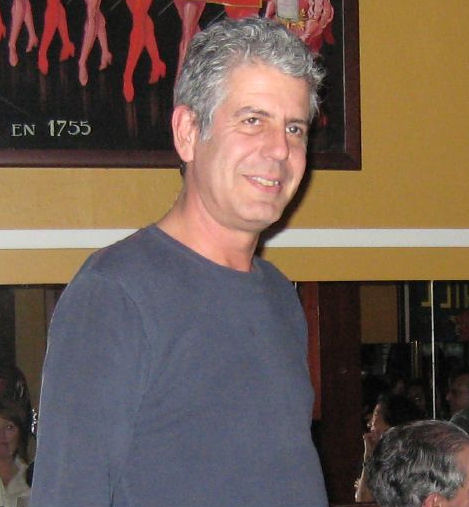
Deeply invested in telling a good story, and enjoying himself in the process, he was a hedonist who savored new experiences and life itself. Which is why I was stunned and puzzled to learn he had hanged himself in his hotel room in France while shooting one of his last episodes. The final one, on New York City’s Lower East Side, will be broadcast on CNN on Sunday, November 11 at 9 p.m.
Often dressed in faded jeans, a loose-fitting shirt or jersey and sneakers, Bourdain was an adventurous and daring gourmet, always willing to sample any dish, no matter how arcane, wildly exotic or seemingly unappetizing. I’m sure he had a cast-iron stomach.
I also appreciated his verbal fluency — his wry, understated, sharply-observed commentaries which spoke to the spirit of the nation he was trying to make sense of and explain.
I developed a taste for Parts Unknown shortly after its debut in the spring of 2013, but I missed many shows. Which is why I tuned in to the Netflix streaming network recently to catch up on shows I had been unable to watch when originally broadcast.
One of the first ones I saw was about Jerusalem. Realizing he was handling a sensitive topic, he acknowledged there was no hope of plumbing the depths of Israel’s capital without upsetting the sensibilities of any number of Jews and Arabs. He instinctively knew that some viewers would brand him — a half-Catholic, half-Jewish American who was raised in a secular home and who had no particular attachment to Israel — as a “terrorist sympathizer,” a “self-hating Jew,” a “Zionist tool,” or an “American imperialist.”
In this segment, he is none of the above. If anything, he’s a neutral and curious observer who feels somewhat ill at ease in his surroundings.
Upon arriving at the Western Wall, he’s accosted by a rabbi who want to put teffelin on him. Bourdain is game, but he can only play along to a certain point. As he honestly puts it, “I’m masquerading as someone I’m not.” Yet he likes Israel, describing it as “pretty awesome” and nicer than southern California.
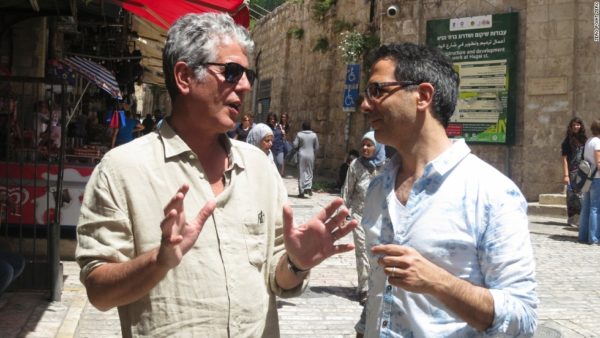
Bourdain’s guide in Jerusalem, the London-based Israeli food maven Yotam Ottolenghi, takes him to cool places. On one of his stops, he bites into a falafel sandwich and pronounces it tasty. On a visit to Eli, a Jewish settlement in the West Bank, he seems uncomfortable. In Ramallah, he speaks to two very unusual Palestinian women, race car drivers. They tell him, “You never know what will happen in Palestine.”
So true.
In quick succession, he passes a walled section of Israel’s separation barrier, drops into a Palestinian refugee camp, and visits a vegetarian restaurant owned by a Jewish-Arab couple. Later, in the Gaza Strip, he tries a traditional chicken-and-rice meal he rates as “absolutely delicious.” Back in Israel, near the Gaza border, he talks to a Jewish restaurateur whose daughter was killed by a Palestinian mortar. Arabs and Jews, concludes Bourdain realistically, are locked in a deadly embrace.
Visiting Spain, he tucks into a mound of snails slathered in almond sauce, attends a bull fight that leaves him ambivalent, observes an eerie Holy Week procession, devours an array of Spanish appetizers, and exults over the architectural magnificence of the Alhambra.
Touring Copenhagen, he spends much of his time in supposedly the world’s finest restaurant, Noma, which is owned by a Macedonian immigrant who arrived in Denmark at the age of 14. Gorging himself on its exquisite fare, Bourdain remarks, “That is incredible.”
Bourdain calls Sicily “one of the most beautiful places” in Europe. There he eats to his heart’s content, downing spaghetti with cuttle fish, horse meat on the grill (“very tasty”) and penne with sun-dried tomatoes and zucchini. But there’s a dark side to this island — the Italian mob, which extorts money from restaurant and shop owners.
In what can be seen as an omen, he refers to his “fragile emotional state.”
South Africa, a country that has made the transition from white minority apartheid and pariah state to multiracial democracy, is Bourdain’s next stop. He samples a sheep’s head in stewed greens, among other dishes, and partakes of Malay food in a Muslim home. In a game park, he shoots an antelope, a stomach-churning experience for some viewers. He ends on an uncertain note: If South Africa can be made to work for all its people, there is hope for the rest of us.
The Punjab, India’s breadbasket, is a kaleidoscope of bright colors and intense flavors. He pays a visit to the Sikh Golden Temple in Amritsar, taking part in a communal meal. He sings the praises of tandoori chicken. He takes a train up to Shimla, the queen of colonial hill stations, and stays in the home of a former maharaja. The atmosphere is intoxicating.
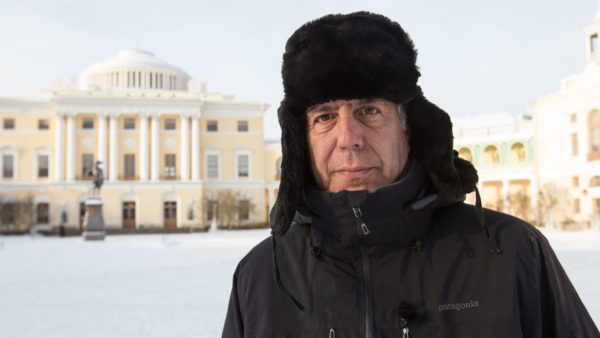
While in Russia, Bourdain voices criticism of President Vladimir Putin, regarding him as an authoritarian leader. Bad things happen to people who cross him, he says. One of Putin’s detractors, Boris Nemtsov, dines with Bourdain. “Russia has a chance to be free,” claims Nemtsov, who was assassinated about three years later. When the subject is not politics, the emphasis is on food. Bourdain heartily consumes Baltic sprats, white fish, caviar, beef dumplings on a bed of cabbage, blini and cold pickled herring. It’s a delightful gastronomic adventure.
Bourdain is also in his element in Thailand. He’s impressed by its intensely regional cuisine, but he’s especially addicted to northern Thai food, with its spicy, sour, bitter and salty notes. At a street stall, he’s offered cow’s blood soup spiked with lemon grass, a local specialty. He recoils, but being Bourdain, he reconsiders and banishes his inhibitions.
This was the quintessential Bourdain, always eager to try something new and tell us all about it in his inimitable style.
